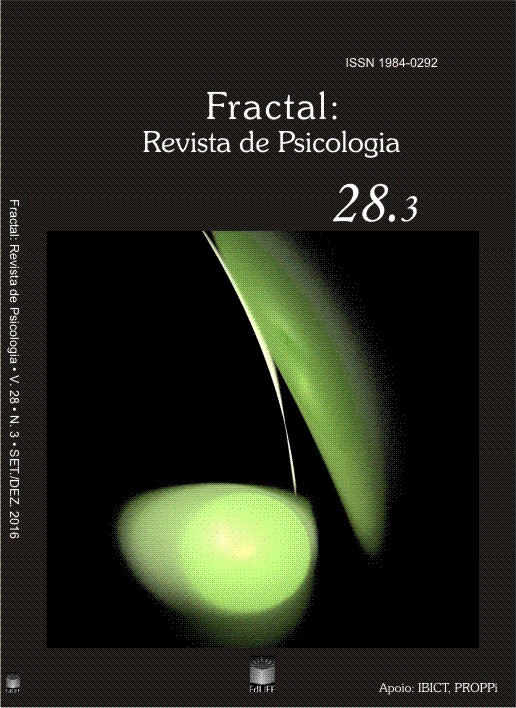Relation between accompanier and accompanied: reflections on the friendship-clinical device
Keywords:
friendship, clinical, political, therapeutic monitoringAbstract
This work is based on a doctoral thesis that aims to reflect on the therapeutic relationship between companion and accompanied and possible approaches to the budding relationship. We use as intercessors, first, the concept of friendship of the philosophers Nietzsche, Montaigne and Blanchot and mutual analysis technique developed by psychoanalyst Sándor Ferenczi, to discuss the movements of proximity and distance that occur in therapeutic monitoring. Moreover, we use the concepts of political friendship in Foucault, Arendt in political action and especially concepts such as Outside, becoming and transversal created by Deleuze and Guattari, fundamental for reflection on the ethical, aesthetic and political dimension of clinic the Therapeutic Accompaniment.Downloads
References
ARENDT, H. A condição humana. 10. ed. Rio de Janeiro: Forense Universitária, 2005.
ARISTÓTELES. Ética a Nicômaco. In: ______. Aristóteles. Tradução de Leonel Vallandro e Gerd Bornheim. São Paulo: Abril Cultural, 1984. Coleção Os pensadores.
BIRMAN, J. Ferenczi: escritos psicanalíticos 1909-1933. Rio de Janeiro: Taurus, 1988.
BLANCHOT, M. Lámitié. Paris: Gallimard, 1971.
CARDOSO, S. Paixão da igualdade, paixão da liberdade: a amizade em Montaigne. In: NOVAES, A. (Org.). Os sentidos da paixão. São Paulo: Companhia das Letras, 1987. p. 125-138.
DELEUZE, G. ¿Que és un dispositivo? In: DELEUZE, G. et al. Michel Foucault, filósofo. Barcelona: Gedisa, 1990, p. 155-161.
DELEUZE, G. Crítica e clínica. Tradução de Peter Pál Pelbart. São Paulo: Editora 34, 1997.
FERENCZI, S. Diário Clínico. Tradução de Álvaro Cabral. São Paulo: Martins Fontes, 1990.
FOUCAULT, M. Microfísica do poder. Rio de Janeiro: Graal, 1979.
FOUCAULT, M. De l’amitié comme mode de vie [Da amizade como modo de vida]. Tradução de Wanderson Flor do Nascimento. Gai Pied, Paris, n. 25, p. 38-39, avril, 1981. Disponível em: http://portalgens.com.br/portal/images/stories/pdf/amizade.pdf. Acesso em: 22 set. 2013.
FOUCAULT, M. História da loucura na Idade Clássica. São Paulo: Perspectiva, 1995.
FOUCAULT, M. A ordem do discurso. São Paulo: Loyola, 1996.
FULGÊNCIO, L. Interpretando a história. Acompanhamento Terapêutico de pacientes psicóticos no Hospital-dia A Casa. In: Equipe de Acompanhantes Terapêuticos do Hospital-dia A Casa (Org.). A rua como espaço clínico, Acompanhamento Terapêutico. São Paulo: Escuta, 1991. p. 231-236.
GUATTARI, F. Caosmose: um novo paradigma estético. Tradução de Ana Lúcia de Oliveira e Lúcia Cláudia Leão. São Paulo: Editora 34, 1992.
LAPLANCHE, J.; PONTALIS, J. B. (Org.). Vocabulário de Psicanálise. Tradução de Pedro Tamen. São Paulo: Martins Fontes, 2001.
MAUER, S. K.; RESNISKY, S. Acompanhantes terapêuticos e pacientes psicóticos: manual introdutório a uma estratégia clínica. Campinas: Papirus, 1987.
MONTAIGNE, M. Ensaios. São Paulo: Abril Cultural, 1972. livro 3.
NIETZSCHE, F. Assim falou Zaratustra: um livro para todos e para ninguém. Rio de Janeiro: Bertrand Brasil, 1994.
ORTEGA, F. Genealogias da amizade. São Paulo: Iluminuras, 2002.
PELBART, P. P. Da clausura do fora ao fora da clausura: loucura e desrazão. São Paulo: Brasiliense, 1989.
ROLNIK, S. B. Hal Hartley et l’éthique de la confiance. Trafic. Révue de Cinéma, [S.l.], n. 12, p. 104-115, 1994.
ROLNIK, S. B. À sombra da cidadania: alteridade, homem da ética e reinvenção da democracia. In: MAGALHÃES, M. C. R. (Org.). Na sombra da cidade. São Paulo: Escuta, 1995. p. 103-119.
SENNETT, R. O declínio do homem público: a tirania das intimidades. Tradução de Lygia Araújo Watanabe. São Paulo: Companhia das Letras, 1995.
SERENO, D.; AGUIAR, C. C. T.; MENDONÇA, L. O Acompanhamento Terapêutico e a Clínica: a função do acompanhante no tratamento. In: Equipe de Acompanhantes Terapêuticos do Hospital-dia A Casa (Org.). A rua como espaço clínico, acompanhamento terapêutico. São Paulo: Escuta, 1991. p. 67-78.
Downloads
Published
How to Cite
Issue
Section
License
Authors publishing in this journal agree to the following terms:
- Authors retain copyright and grant the journal the right of first publication, with the work simultaneously licensed under the Creative Commons Attribution License allowing sharing of the work with acknowledgement of authorship of the work and initial publication in this journal.
- Authors are permitted to enter into additional contracts separately for non-exclusive distribution of the version of the work published in this journal (e.g., publishing in an institutional repository or as a book chapter), with acknowledgment of authorship and initial publication in this journal.

This work is licensed under a Creative Commons Attribution 4.0 International License.
To the extent possible under the law, Fractal: Journal of Psychology has waived all copyright and related rights to the Reference Lists in research articles. This work is published in: Brazil.
To the extent possible under law,Fractal: Journal of Psychology has waived all copyright and related or neighboring rights to Reference lists in research articles. This work is published from: Brazil.







